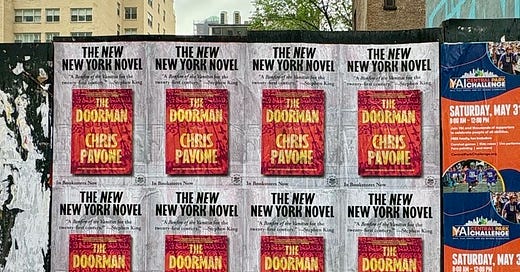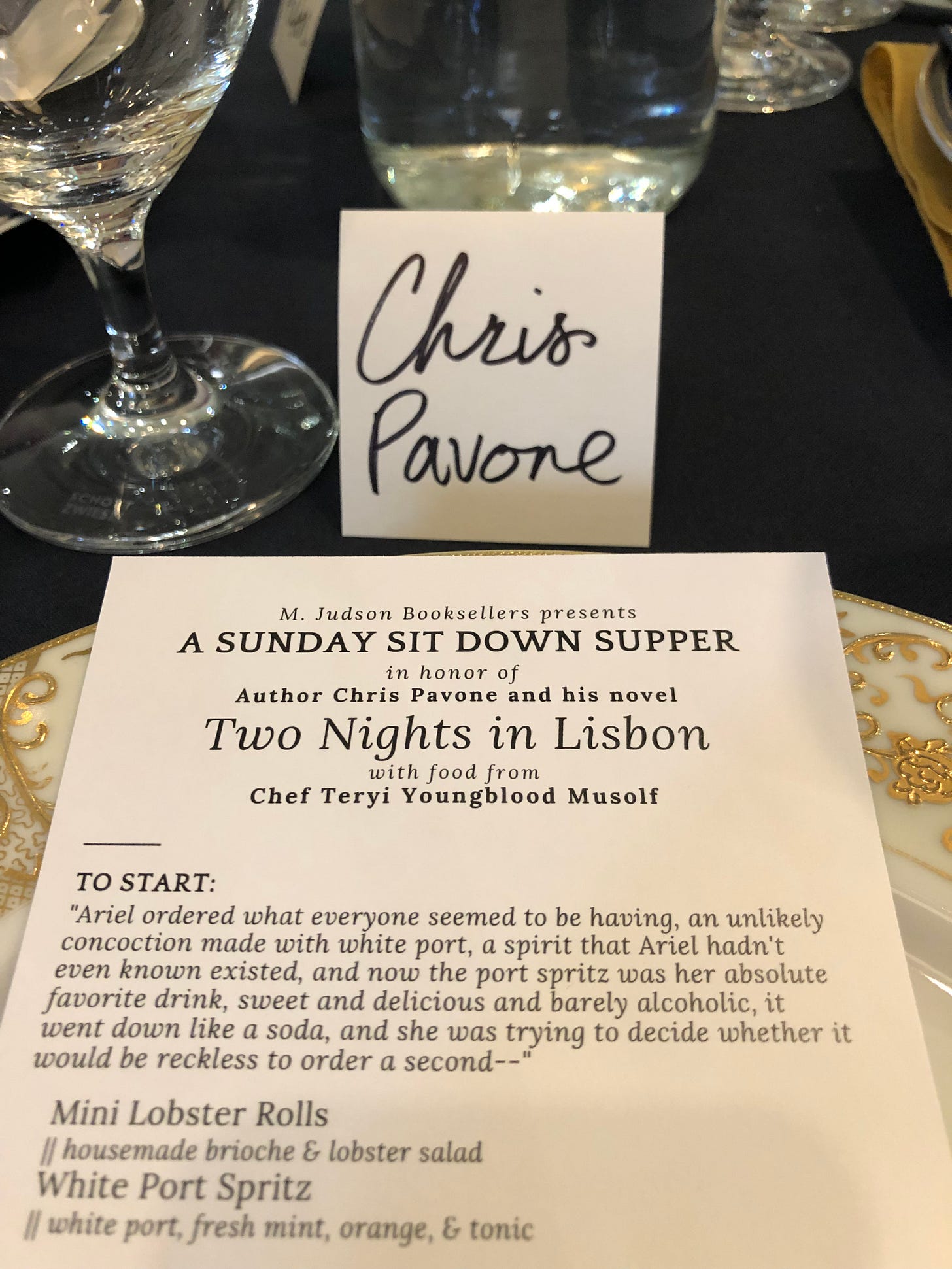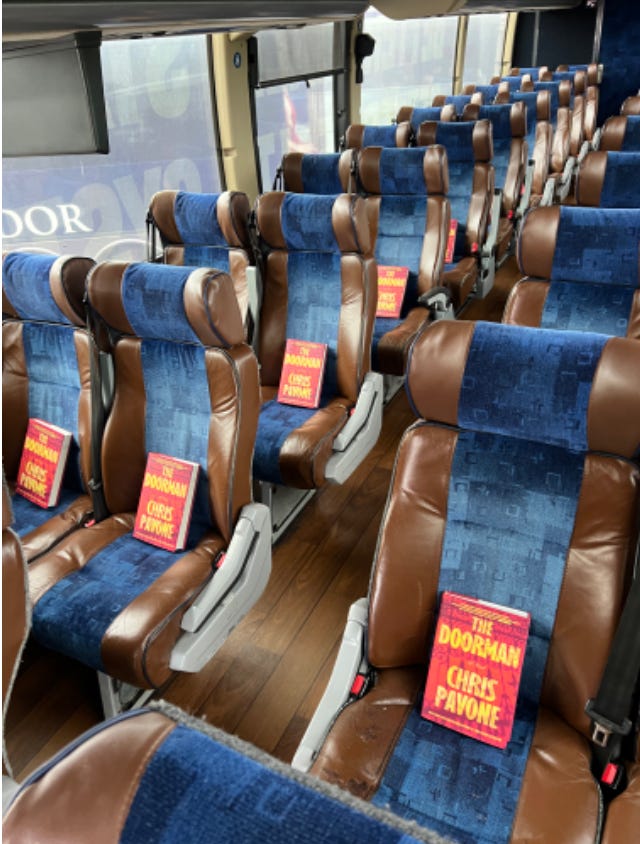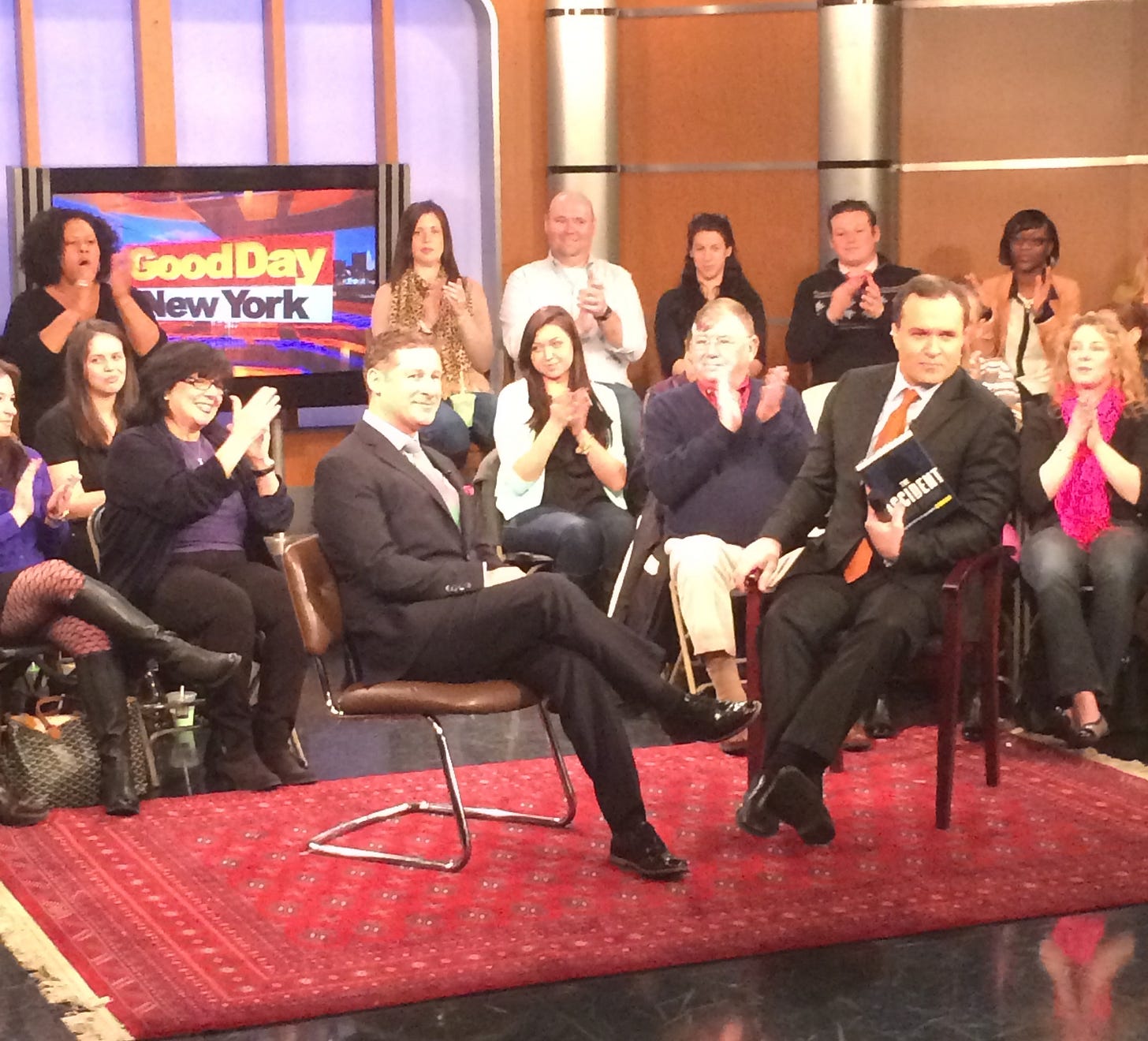Here’s what happened:
My alarm went off at 4:45 a.m., to leave the hotel by 5:15. Air Canada had sent dire warnings about long delays at security, but the real delays turned out be the flight: one delay, a second delay, then outright canceled. I rebooked to depart mid-afternoon, but that flight too was delayed a couple of times, during which I sat on the floor in a corridor near a gate swamped with irritable travelers, before sitting on a bumpy commuter jet, after having spent more than 9 hours in Toronto Pearson Airport.
This was June 2022, and I was on the road for Two Nights in Lisbon. A covid spike was causing airline crew shortages, delays, cancelations, impacting more than half of my dozen flights, and plenty of people’s health. I never stopped worrying about travel problems, canceled events, dominoes falling. In addition to all the other worries that accompany publishing a book. Plus covid.
I arrived to Cleveland, took a taxi to the hotel, dropped my bag, immediately got in another taxi to a suburban library, where there were perhaps two dozen people in the audience. Did half of them purchase the book? Maybe.
My interlocutor was a dear friend, doing me an immense favor. Afterward we went to dinner, with her friend who’d come along. I picked up the check, of course.
Things could’ve been much, much worse. I had not spent the day working in a coal mine, or picking lettuce under a blazing sun. My life had not been in any peril, no one hurled any insults at me. There was nothing about my experience that was an actual hardship. But I had spent more 13 hours of it in transit, and sold 12 books.
Revenue Against Expenses (Math Alert!)
As a rule publishers don’t sell books to consumers. Publishers sell books to wholesalers or retailers, on a sliding discount schedule that for the sake of simplicity we can call 50% of the retail price. So every sale of Lisbon’s $28 hardcover equaled $14 of revenue for the publishing house. Cleveland generated maybe $168 gross for FSG, all of it negated by dinner.
A coach seat, three modest meals, a generic hotel room overlooking a parking lot, taxis to and from the airport and venue and hotel, a cup of coffee, maybe two . . . Without any hint of luxury or leisure or even room service, a publisher can be looking at upwards of $1,000 per day to tour an author.
This expense is part of the book’s marketing budget, which is, unsurprisingly, finite; every dollar spent on the tour is a dollar not spent on something else. And none of those tour dollars are spent inside bookselling or publishing, on putting readers’ eyeballs on the book. This $1,000 per day is spent entirely on moving a human body around, and keeping it housed and fed—spent at Delta and United, Hilton and Westin, Uber and Starbucks and rushed unhealthy meals on airport concourses, waiting for connecting flights.
We’d need to sell 70 hardcovers merely to cover the daily expense of touring; actual profit would still be in the future. I’ve now done nearly 200 book events in the 14 years that I’ve been a published novelist, and I think I count on my two hands the number of those events that have sold more than 70 hardcovers.
Lying in Bed as Midnight Approached
Remember this, I told myself. Two years will go by, or three, and you might forget. You might want to kid yourself that the next tour will be different, because . . . well, why? What, actually, could be meaningfully different? Lisbon’s was my fifth book tour. They weren’t getting better, not for me.
You don’t really want to do this, I told myself. And more importantly—much more—you really don’t want your publisher to spend their marketing dollars like this.
I slept badly, woke early, flew to Detroit, changed planes for St. Louis.
Driving Around Denver with a Media Escort
When I started working in the book business in the early 1990s, big book tours were common: 15-city, 20-city, 30-city tours that could last 2 months or more. If a major publisher was not willing to pay for a major tour, it was a signal that the book was not a priority. The bigger the tour, the stronger the signal that the book was a priority. Two decades ago, when I was working for the legendary publisher Peter Workman, he told me, “You do a 30-city tour so you can say you’re doing a 30-city tour.”
It worked. A book-tour stop was not just a matter of a single 7:00 p.m. event at a bookshop. The day might begin with a segment on a local morning TV show, then a longer conversation on midday radio, and a desk-side chat with the local newspaper’s culture editor for a profile on the next day’s books page, maybe a story in the glossy local weekly, stock signings at Borders and B. Dalton, driving around a city with a media escort, blanketing the market with awareness of the event, the author, the book.
Almost none of that exists anymore. The local morning show doesn’t do book segments, there is no books page, no Borders and no B. Dalton, no media escort. And without all that, is a book tour still worth it?
For a long time, I believed that it was almost a moral responsibility for major publishers to send authors on far-flung tours. Not only to promote whatever new books, but to support the overall health of the ecosystem, to help bookstores maintain their essentiality by filling their events calendars with visiting authors, who themselves—ourselves—bore the same responsibility. Those events in those bookstores were also how readers discovered new writers, and new writers were how book publishing would continue to exist. If we don’t teach first-graders how to play violin, then one day we won’t have orchestras anymore.
It’s hard to accept that the world doesn’t work the way you think it does, or did, or should.
To be fair, some of the 2022 events for Lisbon were wonderful. My favorite was at the independent bookshop M. Judson in Greenville SC, who hosted a sold-out book-with-ticket dinner inspired by the novel, served at formal tables in the middle of the shop—a fantastic idea, an actively fun evening for me. I’ve had plenty of enjoyable book-tour stops, seeing old friends and making new ones, getting to know booksellers and writers, visiting interesting places, meeting friendly and enthusiastic readers. It can be tremendous fun.
But fun is not the point. And the numbers in Toronto before Cleveland, and in St. Louis after, were very similar to the numbers in Cleveland. At another stop, one person showed up. The book was, at that moment, a New York Times bestseller. One person.
Over the past few weeks, people have written to ask me why The Doorman’s book tour doesn’t include their local bookstore, their city, their time zone. This is why.
Books on Buses Bound for Beaches
Here’s what I said to my publisher’s director of marketing and publicity, when we had our first discussion about The Doorman’s publication plan: I’m still eager to get on airplanes for festivals, bookstores, libraries, fundraisers, whatever. And I’d be happy to do the traditional airports-at-dawn book tour—I’d be honored to do it—if we believed it worked. But: does it?
I’m not trying to tell you how to spend your money, I said. But let’s please not spend it on a tour if it’s only because you think that’s what I want. Plane tickets and hotel rooms and taxi cabs don’t necessarily put the book directly in front of actual readers. What’s the best way to do that? I don’t know, and I did not presume to meddle.
So this publication does not include flying to Cleveland or St. Louis. It does include vigorous campaigns on Goodreads and Edelweiss and Amazon and Bookshop, and posters plastered around Manhattan, and books given away on bus seats bound for beaches on Memorial Day weekend.
As of this moment, there are 17 public events on my schedule for The Doorman; there will be more. At one event, FSG put down a credit card for a round of drinks; for a couple others, I’ll be buying a tank or two of gas, tolls, a few ferry tickets. And that’s it.
I also had to purchase some makeup to wear on TV tomorrow morning—Good Day New York, sometime near 9:30. It turns out that not all the old media are entirely extinct.
I appeared on GDNY once before, a decade ago. Back then, the show provided makeup, but apparently not anymore. It’s not just the book business that has changed.
Above, that’s a much younger me in 2014 on camera for GDNY, the same season as below—a much younger Wally, with a much younger Sam, on the beach in Maine.








Such a fine post. It’s remarkable how you weave suspense and nostalgia into such a dry topic: book profits. The marketing shift from the personal meet the author to interwebby algorithms—“if they clicked on a John Lennon story, bought the Hamilton soundtrack, or follow Timothy Chalamet, the Mets or Gwyneth, deliver them ads twice a day for The Doorman”—is jarring. I hope many people read your new book. It’s so good.
I loved The Doorman. Looking forward to seeing you in Bridgehampton on July 18. You’ll get a big turnout!